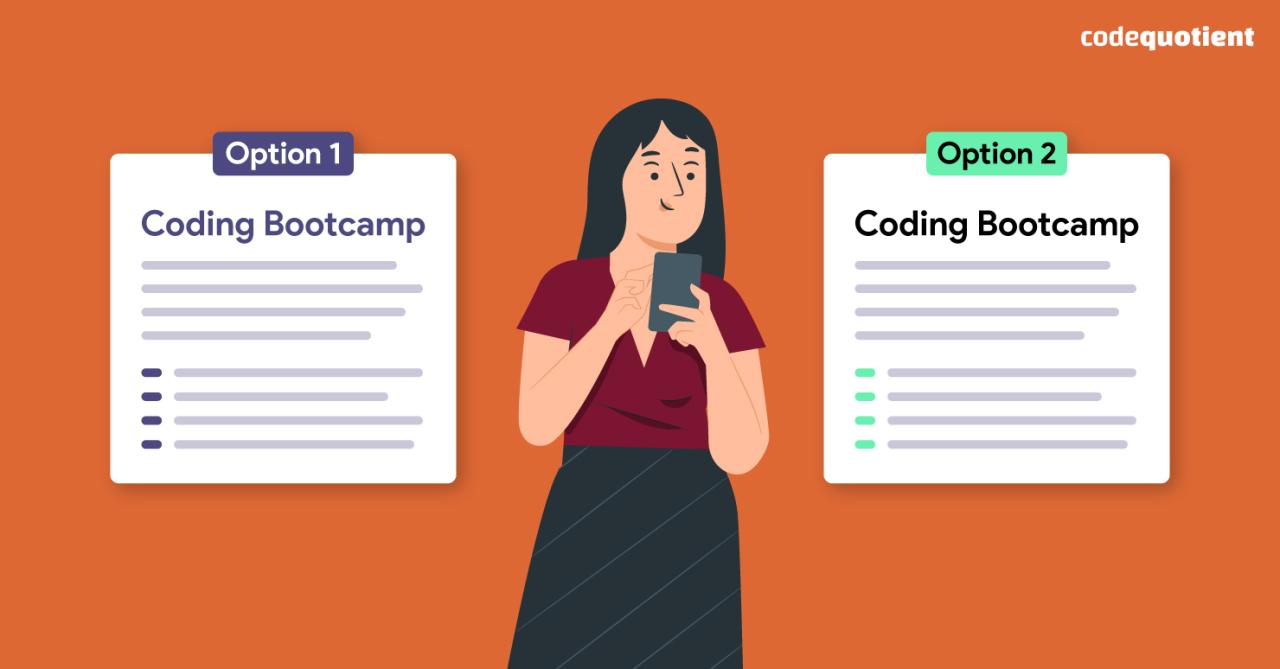Identifying Ideal Candidates: A Good Candidate For Coding Bootcamp

Success in a coding bootcamp hinges on a potent blend of aptitude, motivation, and learning style. Identifying candidates with these qualities is crucial for maximizing their chances of graduating and securing a fulfilling career in tech. This section will delve into the characteristics that define ideal bootcamp candidates.
Key Personality Traits of Successful Bootcamp Graduates
Successful bootcamp graduates often possess a combination of traits that contribute to their success. These include a strong work ethic, resilience in the face of challenges, a proactive learning approach, and excellent problem-solving skills. They are typically self-motivated, able to work independently and collaboratively, and possess a growth mindset – a belief that abilities can be developed through dedication and hard work. Furthermore, effective communication skills are vital for collaborating with instructors and peers, and for articulating technical concepts clearly. Adaptability is also key, as the fast-paced bootcamp environment requires flexibility and the ability to quickly master new concepts.
Demonstrating Coding Aptitude
Aptitude for coding isn’t solely about prior programming experience. While prior experience is beneficial, it’s not a prerequisite. Candidates can demonstrate aptitude through various means. Personal projects, even simple ones, showcase initiative and problem-solving abilities. For example, building a basic website, creating a simple game using a game engine, or contributing to open-source projects, all demonstrate a willingness to learn and apply coding principles. Participation in coding challenges (e.g., HackerRank, LeetCode) provides a quantifiable measure of problem-solving skills. Even documenting a process of learning a new concept or tool, such as creating a tutorial or blog post, shows a commitment to learning and a potential for teaching oneself.
Assessing Intrinsic Motivation, A good candidate for coding bootcamp
Assessing a candidate’s intrinsic motivation is crucial. This goes beyond simply wanting a higher salary. Look for candidates who express a genuine passion for technology and a desire to learn for the sake of learning. In interviews, ask about their past experiences with coding, what excites them about programming, and how they approach challenges. Genuine enthusiasm and a willingness to dedicate the time and effort required are strong indicators of intrinsic motivation. Candidates who solely focus on the financial aspects may lack the persistence needed to navigate the intensive bootcamp curriculum.
Career Change vs. Personal Enrichment
Candidates seeking a career change often demonstrate a higher level of commitment and urgency. They typically have a clear career path in mind and are willing to invest significant time and resources to achieve their goals. Those pursuing personal enrichment, while valuable participants, may have a less defined objective and potentially less commitment to the rigorous demands of the program. Understanding this distinction helps tailor the support and expectations accordingly.
Comparison of High vs. Low Potential Candidates
| Motivation | Aptitude | Prior Experience | Learning Style |
|---|---|---|---|
| High: Intrinsic motivation, clear career goals, strong work ethic | High: Demonstrated problem-solving skills, personal projects, quick learner | High: Prior programming experience, relevant technical skills | High: Adaptable, seeks feedback, actively participates |
| Low: Extrinsic motivation, unclear goals, inconsistent effort | Low: Struggles with problem-solving, limited personal projects, slow learner | Low: Minimal or no programming experience, limited technical skills | Low: Resistant to feedback, passive learner, infrequent participation |
Assessing Technical Skills & Prior Knowledge

Identifying a strong coding bootcamp candidate requires a nuanced approach that goes beyond simply reviewing resumes. It’s crucial to assess their existing technical abilities, problem-solving skills, and comfort level with technology, all while acknowledging that prior extensive coding experience isn’t always necessary. This evaluation should focus on potential and aptitude rather than solely on existing knowledge.
Evaluating a candidate’s existing technical skills, even if minimal, can be done effectively through a multi-pronged approach. This involves carefully examining their responses to targeted questions, analyzing any portfolio work they may have, and using practical exercises designed to reveal their understanding of core programming concepts. Remember that a willingness to learn and a demonstrated aptitude for problem-solving often outweigh extensive prior knowledge.
Evaluating Existing Technical Skills
We can effectively assess a candidate’s current technical skills through several methods. First, a structured interview focusing on their understanding of fundamental programming concepts (like variables, data types, and control flow) can provide valuable insights. Second, reviewing any personal projects or coding samples (even if rudimentary) offers a practical demonstration of their skills. Third, a short, focused coding challenge (detailed below) can objectively assess their problem-solving approach and basic programming logic. Finally, asking about their experience with specific technologies, even if limited to basic usage, can illuminate their comfort level and prior exposure.
Gauging Problem-Solving Abilities Through Practical Exercises
Practical exercises are invaluable for assessing problem-solving abilities. These exercises should be designed to challenge candidates to think critically and apply logical reasoning, rather than simply testing their knowledge of specific syntax or libraries. For instance, a task involving algorithm design or debugging a small piece of code can reveal much about a candidate’s analytical skills and their ability to approach challenges methodically. Observing their approach, their ability to articulate their thought process, and their response to setbacks is just as important as achieving a perfect solution.
Common Misconceptions About Required Prior Knowledge
A prevalent misconception is that extensive prior coding experience is a prerequisite for coding bootcamps. While some prior exposure is beneficial, many successful bootcamp graduates enter with minimal or even no formal programming experience. The bootcamp’s intensive curriculum is designed to bring students up to speed quickly, focusing on practical skills and real-world application. Another misconception is that a strong mathematical background is absolutely essential. While a solid grasp of logic and problem-solving is crucial, advanced mathematical knowledge isn’t always a necessity, particularly for front-end development roles.
Assessing Comfort Level with Technology and Learning
A candidate’s comfort level with technology and their capacity for learning new concepts are crucial factors. This can be assessed through open-ended questions about their prior technological experiences, their approach to learning new software or skills, and their willingness to embrace challenges. Candidates who demonstrate a proactive approach to learning, a willingness to seek help when needed, and a positive attitude towards tackling unfamiliar concepts are more likely to succeed in the fast-paced bootcamp environment. Their responses should reflect their ability to adapt to new information and their proactive approach to self-learning.
Coding Challenge: Simple Number Sorting
This challenge assesses fundamental programming logic. Write a program that takes a list of numbers as input (e.g., [5, 2, 9, 1, 5, 6]) and returns the same list sorted in ascending order. The program should handle both positive and negative numbers. The focus is on demonstrating a clear understanding of loops, conditional statements, and basic data manipulation. A solution using any programming language is acceptable, but the candidate should be able to explain their code clearly. The emphasis is on clear, efficient code and a demonstrable understanding of the underlying logic. This task avoids complex data structures or algorithms, focusing on core programming concepts.


Tim Redaksi